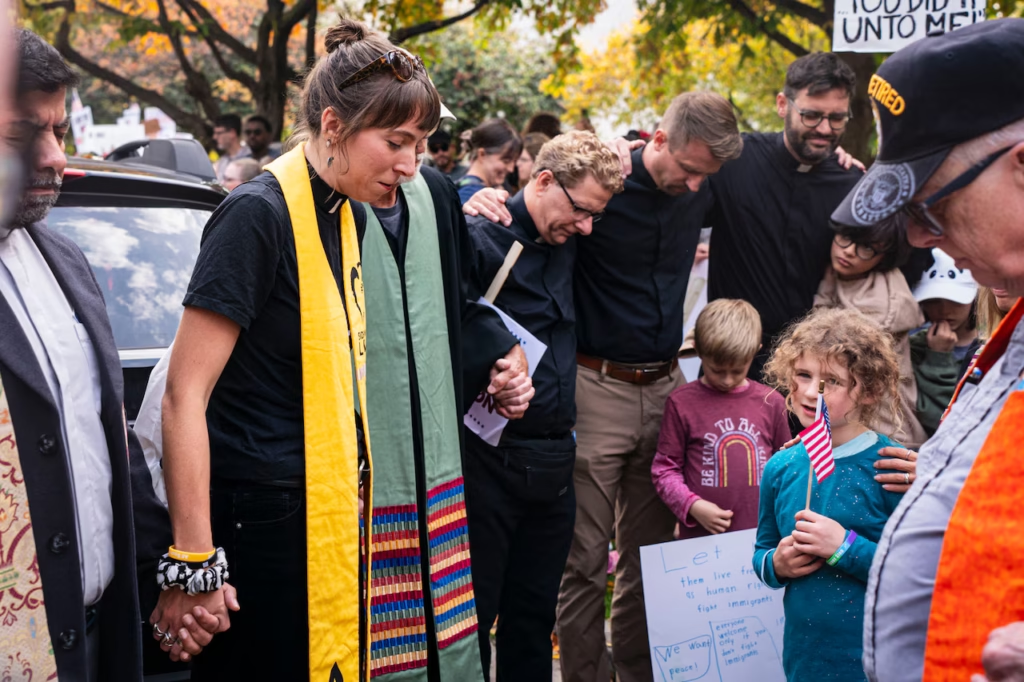Nineteenth Sunday after Pentecost (Proper 24) 19 October 2025: Jeremiah 31:27-34; Psalm 119:97-104; 2 Timothy 3:14-4:5; Luke 18:1-8
Jesus wants his disciples to remember to pray, so, of course, we hear a parable. In this parable we have two people who are apparently stubborn. The widow keeps badgering the judge. The judge does not care about justice, but he doesn’t want to be bothered. The widow gets the justice she wanted, if perhaps for the wrong reason.
The idea that it’s that simple, you pray and prayers are answered, is hard for me to swallow. Are my prayers answered? Not always, and certainly not always as I would wish. Yet Jesus asks “Listen to what the unjust judge says. And will not God grant justice to his chosen ones who cry to him day and night? Will he delay long in helping them?“
Delay? I read of people jailed for twenty, thirty and more years for crimes they did not commit and I am not sure they would say God was listening. And many of us have watched faithful servants of the Lord suffer from disease, and not be healed in spite of all their own prayers and the prayers of those who love them. We know that at the height of COVID-19, many families prayed for loved ones who died: did God really love those who survived more than those who died?
But Jesus tells us to keep praying, that God will grant justice. If there’s one thing I’ve learned from many years of prayer it is to be open to what they can do. Our prayers may help bring peace to those who are ill; they may make the prisoners comforted. When I pray two things happen. First, I give the problem over to God, and give up the illusion that I am in control. But I also am given strength to act on those prayers where I have some ability to help answer them, to act where I can.
This is a hard time to read this gospel. We have been praying for justice for migrants and refugees for years. Yet their lives seem to be getting worse, not better. While the judges have been doing their best, other officials of the government have been determined to hurt them. When pastors are beaten by federal agents for praying for those detained, when Catholic priests are refused the right to bring communion to those imprisoned, it is not clear that our prayers make a difference. But after the priests were denied access to those imprisoned by ICE, those in the procession kept singing, and one of the priests said, “‘“’I’m sure they heard us singing,’ Father Hartnett said, speaking to the local CBS News affiliate. ‘I’m sure they heard us talking, so hopefully they get strength from our presence.’” Those in the procession prayed with their feet and with their song as much as with what we might think of as prayer.
When you are struggling, it does help to know that others are praying for you. Just as the widow took action by annoying the judge, so we, through our public and private prayers, make visible the shape of God’s kingdom: where the hungry are fed, the prisoners freed, the humble lifted high. God’s Kingdom reverses the order of this world. In this Kingdom, there is justice.
Jesus’ parable reminds us also that God works through us. God did not answer the widow’s prayers, the judge did. So our prayers, public and private are important. While they were not framed that way, yesterday’s No King’s protests could be seen as a large public prayer for justice. I noted several clergy (wearing collars) in Merced: they made prayer visible.
So let us pray. And let us keep praying. We pray for justice, and we pray for the Kingdom of God, where
He has cast down the mighty from their thrones,
and has lifted up the lowly.
He has filled the hungry with good things,
and the rich he has sent away empty. (Luke 1:53-55)

Rev. Greta Jo Seidohl prays with the two dozen clergy members she helped organize for the No Kings protest on Saturday, October 18, 2025 at Rosa Parks Circle in Downtown Grand Rapids, Mich. Chloe Trofatter | MLive.com

Leave a Reply